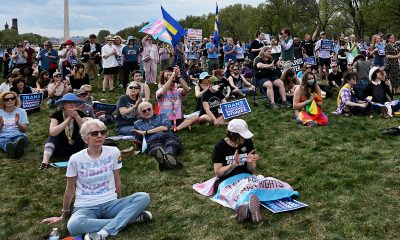National
Feinstein on DOMA repeal: ‘We’re in this for the long march’
Calif. senator says no time set for committee to report out repeal bill

Sen. Dianne Feinstein (D-Calif.) maintained on Tuesday that backers of legislation that would repeal the Defense of Marriage Act are in the fight “for the long march” and will continue pushing for the bill’s passage even it doesn’t make it through this Congress.
Feinstein, the sponsor of DOMA repeal legislation known as the Respect for Marriage Act, asserted supporters will continue to press on with the measure at the National Press Club during a news conference intended to highlight the bill and a Senate hearing set to take place Wednesday on the measure.
“I want to assure you that this isn’t a cause which we are going to drop,” Feinstein said. “We are not faint hearts about this. If we don’t succeed this session, we will try again next session. If we don’t succeed next session, we will try again the following session, but, believe me, we will continue this effort until the battle is won.”
Among the 14 senators who voted against DOMA when it came before the Senate in 1996, Feinstein said she opposed the measure at the time because she thought it was “unconstitutional” and continues to believe that to this day about the anti-gay law.
Following the news conference — which was organized by the Courage Campaign, a progressive organization working to build support in the Senate for DOMA repeal — reporters questioned Feinstein about the prospects for passing repeal legislation during the 112th Congress. Observers have said passage of any pro-LGBT bill — including DOMA repeal — wouldn’t happen as long as Republicans remain in control of the House.
Asked whether she thinks DOMA repeal would pass the Republican-controlled House, Feinstein acknowledged passage in that chamber remains a challenge, but reiterated “we’re in this for the long march, not just for the short haul.”
Observing litigation is making its way through the federal courts that could strike down DOMA, Feinstein said she wants legislative repeal of DOMA in addition to having the judiciary rule against the law. Asked whether she had a preference for legislative or judicial action, the California Democrat replied, “I think we should do both, so that we secure the arena forever.”
The necessary 10 votes in the Senate Judiciary Committee are present to report out the legislation to the floor. Each of the Democrats on the committee have signaled — through co-sponsorship or on-the-record comments — they would support the bill. Sen. Patrick Leahy (D-Vt.), chair of the panel, could report out the legislation to the floor, if he so chose, following the hearing on Wednesday.
However, Feinstein said a timeframe hasn’t yet been established for when the legislation would proceed to the floor — or even if it would happen this Congress — as she acknowledged that the votes are present in committee to move forward.
“There’s no timeframe right now and this is — I believe we have votes from all Democrats, so whether we’ll pass it out on a majority basis, I don’t know,” Feinstein said.
Feinstein maintained that the purpose of the upcoming hearing would be to demonstrate the hardship that DOMA has on married same-sex couples.
“I think it’s very important that we achieve a level of understanding of what this is — that it’s not affording any special rights,” Feinstein said. “It is simply saying that if you’re legally married in a state, the federal government can’t prevent your spouse, for example, from getting Social Security benefits — those kinds of things that are afforded to married couples.”
Under questioning from the Washington Blade, Feinstein also responded to criticism about the scheduled witnesses for the hearing being all white and the lack of representation of bi-national couples at the hearing. Gay activist Dan Choi has spoken out against the selection of the witnesses for being what he called “exclusively white and privileged,” even though the hearing notice indicates the same-sex couples set to testify have suffered economic hardship because of DOMA.
Feinstein said she believes the selection of witnesses accurately represents the issues LGBT couples face under DOMA.
“Every couple has a different story to tell,” Feinstein said. “That’s for sure. The point is, these are all legally married people. And the point is marriage is the preserve of the state, not the federal government. Just as all family matters, abortion, adoption, inheritance are really state law. That’s why one state is different from another state.”
A transcript of the exchange between Feinstein and reporters on DOMA repeal legislation follows:
Reporter: When will the bill before the Senate Judiciary Committee? Is there a timeframe?
Dianne Feinstein: Oh, it’s before the Judiciary Committee. The hearing is tomorrow.
Reporter: But a vote in committee? A markup?
Feinstein: No. There’s no timeframe right now and this is — I believe we have votes from all Democrats, so whether we’ll pass it out on a majority basis, I don’t know. I think it’s very important that we achieve a level of understanding of what this is — that it’s not affording any special rights. It is simply saying that if you’re legally married in a state, the federal government can’t prevent your spouse, for example, from getting Social Security benefits — those kinds of things that are afforded to married couples.
Reporter: Senator, is there any Republican support from your bill?
Feinstein: Not at this time. I think it’s a hard time because of the Tea Party and the sort of ideological bent right now. But that’s going to change.
Reporter: You said that the president’s opinion on marriage equality — should he come out in favor of it — would certainly be welcome. You’re hoping he endorses repeal. Have you had any talks with the administration on the bill?
Feinstein: No. I haven’t precisely. I was very heartened when the administration came out with their belief that it was unconstitutional, and I think that’s a major step forward. The issue will go to the Supreme Court. That’s one way of the issue being solved and the other way is legislatively.
Reporter: Do you have a preference?
Feinstein: Oh, I think we should do both, so that we secure the arena forever.
Reporter: Do you think you’ll have any trouble getting it through the House?
Feinstein: Right now I think it will, but as I said, we’re in this for the long march, not just for the short haul.
Reporter: Senator, the selection of witnesses for tomorrow’s hearing has come under criticism. There are no racial minorities who will be testifying about how DOMA affects them. Also, there’s no bi-national couples who will be testifying —
Feinstein: I can’t answer that because the chairman usually puts together the witnesses. I think we were asked to submit one couple, is that right? [Feinstein aide: “We submitted a number of selections.]
…
Reporter: But really quickly, do you think the selection of witnesses accurately represents how DOMA impacts same-sex couples.
Feinstein: Yes. I mean, every couple has a different story to tell. That’s for sure. The point is, these are all legally married people. And the point is marriage is the preserve of the state, not the federal government. Just as all family matters, abortion, adoption, inheritance are really state law. That’s why one state is different from another state.
Reporter: Senator, how about within the broader Democratic caucus. Do people want this? Is this something that your fellow senators, you sense, want a floor vote on even if it can’t pass in the House?
Feinstein: It would be, of course, ideal to have a floor vote and have it pass. It would not be ideal to have a floor vote and have it fail. I’m not into failure as an option.
Reporter: How did you feel all those years ago when you were one of … 14 [senators who voted against DOMA] and how have things changed since then?
Feinstein: I think eyes have opened. I think more and more people across this land know people who are gay, who want to have a lasting relationship, who look at marriage as an economic agreement as well as an emotional agreement, who want to raise children and do raise children — many of them — children who have no other option. So, it becomes an important social gift, too.
Thank you, bye.
U.S. Military/Pentagon
Air Force rescinds rule barring inclusion of preferred pronouns in email signatures
Conflict with language in military funding package may explain reversal

The U.S. Air Force has issued a “directive to cease the use of ‘preferred pronouns’ (he/him, she/her, or they/them) to identify one’s gender identity in professional communications,” according to a report published in the Hill on Wednesday.
The rule, which applies to both airmen and civilian employees, was first adopted on Feb. 4 pursuant to President Donald Trump’s anti-transgender executive order called, “Defending Women from Gender Ideology Extremism and Restoring Biological Truth to the Federal Government.”
Days after the administration’s issuance of that order on the first day of the president’s second term, the Office of Personnel Management instructed agencies across the whole of the federal government to remove pronouns from email signatures and enforce the policy barring employees from using them.
Additionally, on Jan. 27 Trump published an order barring trans people from joining the U.S. Armed Forces, indicating that those who are currently in serving would be separated from the military. The Pentagon is fending off legal challenges to the ban in federal courts.
Particularly given the extent of the new administration’s efforts to restrict the rights of trans Americans and push them out of public life, the Air Force’s reversal of the pronoun guidance was surprising.
According to reporting in Military.com, the move might have come because officials concluded the rule was in conflict with language in the military appropriations funding legislation passed by Congress in 2023.
The NDAA established that the defense secretary “may not require or prohibit a member of the armed forces or a civilian employee of the Department of Defense to identify the gender or personal pronouns of such member or employee in any official correspondence of the Department.”
The White House
USCIS announces it now only recognizes ‘two biological sexes’
Immigration agency announced it has implemented Trump executive order

U.S. Citizenship and Immigration Services on Wednesday announced it now only “recognizes two biological sexes, male and female.”
A press release notes this change to its policies is “consistent with” the “Defending Women from Gender Ideology Extremism and Restoring Biological Truth to the Federal Government” executive order that President Donald Trump signed shortly after he took office for the second time on Jan. 20.
“There are only two sexes — male and female,” said DHS spokesperson Tricia McLaughlin in a statement. “President Trump promised the American people a revolution of common sense, and that includes making sure that the policy of the U.S. government agrees with simple biological reality.”
“Proper management of our immigration system is a matter of national security, not a place to promote and coddle an ideology that permanently harms children and robs real women of their dignity, safety, and well-being,” she added.
The press release notes USCIS “considers a person’s sex as that which is generally evidenced on the birth certificate issued at or nearest to the time of birth.”
“If the birth certificate issued at or nearest to the time of birth indicates a sex other than male or female, USCIS will base the determination of sex on secondary evidence,” it reads.
The USCIS Policy Manuel defines “secondary evidence” as “evidence that may demonstrate a fact is more likely than not true, but the evidence does not derive from a primary, authoritative source.”
“Records maintained by religious or faith-based organizations showing that a person was divorced at a certain time are an example of secondary evidence of the divorce,” it says.
USCIS in its press release notes it “will not deny benefits solely because the benefit requestor did not properly indicate his or her sex.”
“This is a cruel and unnecessary policy that puts transgender, nonbinary, and intersex immigrants in danger,” said Immigration Equality Law and Policy Director Bridget Crawford on Wednesday. “The U.S. government is now forcing people to carry identity documents that do not reflect who they are, opening them up to increased discrimination, harassment, and violence. This policy does not just impact individuals — it affects their ability to travel, work, access healthcare, and live their lives authentically.”
“By denying trans people the right to self-select their gender, the government is making it harder for them to exist safely and with dignity,” added Crawford. “This is not about ‘common sense’—it is about erasing an entire community from the legal landscape. Transgender, nonbinary, and intersex people have always existed, and they deserve to have their identities fully recognized and respected. We will continue to fight for the rights of our clients and for the reversal of this discriminatory policy.”
Federal Government
Mass HHS layoffs include HIV/AIDS prevention, policy teams
Democratic states sue over cuts

Tuesday began a series of mass layoffs targeting staff, departments, and whole agencies within the U.S. Department of Health and Human Services under Secretary Robert F. Kennedy Jr., who reportedly plans to cut a total of 10,000 jobs.
On the chopping block, according to reports this week, is the Office of Infectious Disease and HIV/AIDS Policy. A fact sheet explaining on the restructuring says “a new Administration for a Healthy America (AHA) will consolidate the OASH, HRSA, SAMHSA, ATSDR, and NIOSH, so as to more efficiently coordinate chronic care and disease prevention programs and harmonize health resources to low-income Americans.”
The document indicates that “Divisions of AHA include Primary Care, Maternal and Child Health, Mental Health, Environmental Health, HIV/AIDS, and Workforce, with support of the U.S. Surgeon General and Policy team.”
“Today, the Trump administration eliminated the staff of several CDC HIV prevention offices, including entire offices conducting public health communication campaigns, modeling and behavioral surveillance, capacity building, and non-lab research,” said a press release Tuesday by the HIV + Hepatitis Policy Institute.
The organization also noted the “reassignments” of Jonathan Mermin, director of the National Center for HIV, Viral Hepatitis, STD, and TB Prevention, and Jeanne Marrazzo, director of the National Institutes of Health’s National Institute of Allergy and Infectious Diseases. Both were moved to the Indian Health Service.
“In a matter of just a couple days, we are losing our nation’s ability to prevent HIV,” said HIV + Hepatitis Policy Institute Executive Director Carl Schmid. “The expertise of the staff, along with their decades of leadership, has now been destroyed and cannot be replaced. We will feel the impacts of these decisions for years to come and it will certainly, sadly, translate into an increase in new HIV infections and higher medical costs.”
The group added, “We are still learning the full extent of the staff cuts and do not know how the administration’s announced reorganization of HHS will impact all HIV treatment, prevention, and research programs, including President Trump’s Ending the HIV Epidemic initiative,” but “At the moment, it seems that we are in the middle of a hurricane and just waiting for the next shoe to drop.”
A group of 500 HIV advocates announced a rally planned for Wednesday morning at 8 a.m., at the U.S. Capitol lawn across from the Cannon House Office Building, which aims to urge Congress to help stop the cuts at HHS.
“Over 500 advocates will rally on Capitol Hill and meet with members of Congress and Hill staff to advocate for maintaining a strong HIV response and detail the potential impact of cuts to and reorganization of HIV prevention and treatment programs,” the groups wrote.
The press release continued, “HHS has stated that it is seeking to cut 10,000 employees, among them 2,400 CDC employees, many doing critical HIV work. It also seeks to merge HIV treatment programming into a new agency raising concerns about maintaining resources for and achieving the outstanding outcomes of the Ryan White HIV/AIDS Program.”
On Tuesday a group of Democratic governors and attorneys general from 23 states and D.C. filed a lawsuit against HHS and Kennedy seeking a temporary restraining order and injunctive relief to halt the funding cuts.
U.S. Centers for Disease Control and Prevention withdrew approximately $11.4 billion in funding for state and community health departments during the COVID-19 pandemic response, along with $1 billion to the Substance Abuse and Mental Health Services Administration.
“Slashing this funding now will reverse our progress on the opioid crisis, throw our mental health systems into chaos, and leave hospitals struggling to care for patients,” New York Attorney General Letitia James said.





















